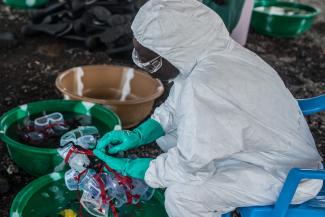Ebola epidemic
Long-term commitment

On 18 September 2014, the UN Security Council declared that the Ebola epidemic is threatening world peace and global security. The epidemic has since grown worse in Liberia, Sierra Leone and Guinea however. The World Health Organisation (WHO) is reporting more deaths daily. The number of infections is rising exponentially. By the end of the year, there may be more than 100,000 cases.
These facts imply dreadful human suffering. So far, there is neither a therapy nor a vaccine for this disease. The only way to prevent further infections is to isolate patients. Children are becoming orphans every day; entire families are wiped out. The virus is attacking all segments of society. Moreover, it is destroying health-care systems that were week from the outset. It is stigmatising the doctors and nurses who are doing their jobs and are not infected. One consequence is that people die of other illnesses which can be treated. Food security is also being undermined because many farmers have become unable to work on their fields. Moreover, borders have been closed.
There is a serious danger of Liberia, Sierra Leone and Guinea plunging back into violent turmoil. They are among the world’s poorest countries and most fragile states, scarred by past conflicts.
Germany’s Federal Government is aware of the extraordinary urgency of this crisis. It is coordinating efforts with its international partners to lend effective support fast. The Foreign Office, BMZ, the Health Ministry, the Defence Ministry and the Home Ministry are contributing to the current package of measures, which includes establishing an airlift to West Africa, setting up treatment centres, supporting private humanitarian groups (such as Doctors without Borders) as well as German research institutes that now help to diagnose patients and train health workers on the ground in West Africa.
The BMZ is also acting in support of the WHO action plan. The plan is designed to raise awareness of the disease, prevent infections, train doctors and nursing staff and install additional treatment centres for Ebola patients. Moreover, the BMZ is supporting the World Food Programme, UNICEF and various non-governmental organisations that are contributing to the fight against Ebola. In total, the BMZ has committed € 60 million, and Germany’s contribution to multilateral efforts now amounts to almost € 70 million. On top of all this, the BMZ is making full use of its capacities and networks in development cooperation, for instance by directing local staff in West Africa to support awareness raising and Ebola prevention. The obvious immediate priority is to save lives. At the same time, we must consider how to help the countries concerned build the capacities they need to prevent the next catastrophe.
No doubt, health care must improve in order to prevent future outbreaks of Ebola. Nigeria and Senegal have succeeded in containing the epidemic thanks not only to the authorities’ fast response but also to comparatively strong health-care systems. Liberia, however, has only one doctor and about 250 nurses per 100,000 inhabitants! Matters are similarly desperate in Sierra Leone and Guinea. Healt hcare is depressingly poor in all three countries. However, that must not distract us from the state of other basic services such as education, water supply, sanitation, electricity and transport. All these things must improve for the people to trust government agencies once more. In the most dramatic way, the current Ebola crisis is proving that the international community must commit to supporting this world region long term in order to safeguard peace and security.
Thomas Silberhorn is parliamentary state secretary at Germany’s Federal Ministry for Economic Cooperation and Development (BMZ).
http://www.bmz.de








